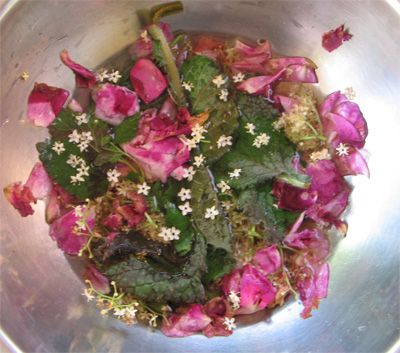Articles
Make Your Own Herbal Skin Care
 Did you know….
Did you know….
Your skin is your largest organ, it respires (breathes), regulates body temperature and absorbs both beneficial and harmful substances into the blood stream, nervous and lymph systems – that includes all the personal soaps, wash gels, shampoos, conditioners and plethora of skin creams, tonics, cleansers, moisturisers, anti-wrinkle, anti-pimple, aftershaves and everything we put on our skin and come into regular contact with.
THE BARE FACTS….
- your skin can weigh up to 3.5 Kg and cover up to 2 square meters surface area
- Over 20,000 untested chemicals are used in perfumes and to fragrance make-up, skin-care products, soaps, shampoos, deodorants, detergents and numerous other everyday item
- Sensitivity to chemicals can contribute to asthma, migraine, fatigue, and immune system deficiency
- Mineral oils and creams based on petrochemicals block the skin and leach vitamins out of the body, especially Vitamins. A, D & E
Natural & herbal skin care products you can make for yourself include:
Cleansers & scrubs: oatmeal, almond meal
Steam baths: fresh & or dried herbs & boiling water in bowl
Skin Toners: Rose water, Lavender water
Face packs: Dry-Normal skin: cream, banana, rose petals. Oily skin: tomato, cucumber
Moisturisers: natural oils, infused oils, creams (emulsions)
Healing ointments: calendula, comfrey
Hair care: Herbal Vinegars (conditioner wash, 1 Tblsp/liter water), Rosemary oil, beer
Hands: comfrey oil
Nails: wheatgerm oil
Herbal baths: fresh herbs and flowers, dried herbs in muslin cloth
Massage & body oils: infused herbal oils, essential oils in base oil
 BASIC INGREDIENTS COMMONLY USED
BASIC INGREDIENTS COMMONLY USED
Herbs:
- Fresh herbs from the garden
- Dried herbs (home-grown/dried, store bought)
Things commonly found in the kitchen
- Cucumber Eggs Oranges
- Cream Honey Tomato
- Copha or coconut oil Lemons Wheatgerm
- Beer Milk Vinegar
- Banana Oatmeal Yogurt
Other ingredients –
most of these can be readily purchased in health food shops, chemist, deli, supermarket, herbalist etc
- Almond powder Aloe Vera Gel
Cold pressed oils (almond, avocado, wheatgerm, olive)
Vegetable oils – sunflower, olive, coconut
Essential oils (rose, lavender, lemon, ilang, rosemary etc)
Herbal waters (witchhazel, rose, orange blossom, jasmine)
Herbal extracts/tinctures (calendula, chamomile, nettle, sage)
Distilled water Bees wax
Implements you might need
- wooden spoon
measuring spoons (teaspoon, tablespoon)
measuring cup (regular plus medicine for small amounts)
dropper
glass bowl
enamel bowl
stainless steel bowl
cutting board
cutting knife
mortar & pestle or rolling pin
hand mixer/ beater
double boiler or suitable substitute
plastic film (e.g. cling wrap)
kitchen scales with small measurements (e.g 2 gram accuracy)
glass containers – jars, bottles etc with plastic or ceramic lid
Want to know more?
Check out these recipes and practical tips by Robyn Francis
Garden Apothecary #1 Infused oils and ointments – Robyn Francis
Related Articles:
Medicinal Plants – Use of and means of Extraction – N. Llewelyn-Smith
Robyn’s Kitchen – Sally Fields


